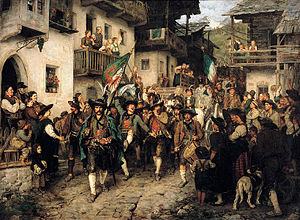Tyrolean rebellion
| Tyrolean Rebellion | |||||||
|---|---|---|---|---|---|---|---|
| Part of the War of the Fifth Coalition | |||||||
 Homecoming of Tyrolean Militia in the War of 1809 by Franz Defregger |
|||||||
|
|||||||
| Belligerents | |||||||
|
Supported by: |
|||||||
| Commanders and leaders | |||||||
|
|
|
||||||
| Strength | |||||||
| 42,000 | 20,000 | ||||||
| Casualties and losses | |||||||
| 5,000 | 2,500 | ||||||
The Tyrolean Rebellion of 1809 (German: Tiroler Volksaufstand) was a rebellion of peasants in the County of Tyrol led by Andreas Hofer against the occupation of their homeland by the French and Bavarian troops within the context of the War of the Fifth Coalition against Napoleon I.
In September 1805 the Electorate of Bavaria under Prince-elector Maximilian I Joseph of Wittelsbach, that had been allied with the Habsburg Monarchy under the common federally structured Holy Roman Empire, went over to Napoleonic France: the Bavarian Minister Count Maximilian von Montgelas, realizing the French superiority while fearing the ambitions of the newly established Austrian Empire, signed a secret defence alliance at Bogenhausen. At the end of the War of the Third Coalition shortly afterwards, Bavaria found itself on the victorious side. Upon the 1805 Peace of Pressburg it not only was elevated to a kingdom, it also gained French-occupied Tyrol, which since 1363 had been held by the Austrian Habsburgs, who, heavily defeated by Napoleon at the Battle of Austerlitz, were forced to renounce it. The French officially handed over the Tyrolean county including the secularized Bishopric of Trent (Trentino) to Bavaria on 11 February 1806.
...
Wikipedia
